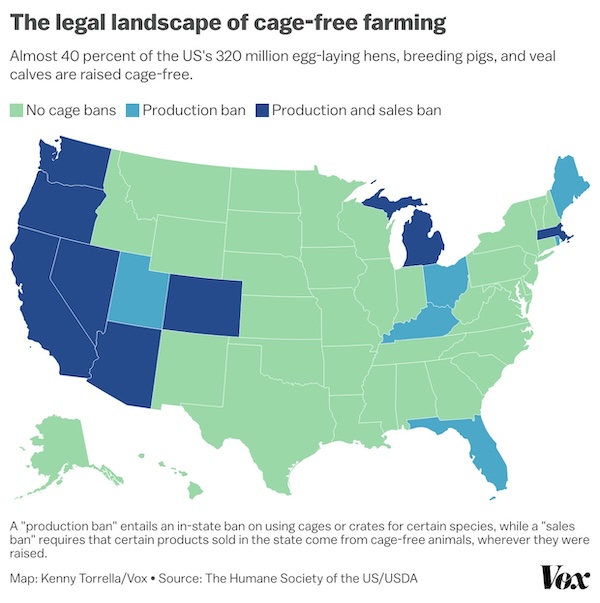The Trump Administration recently sued California over the state’s chicken-related animal confinement rules. The U.S. Department of Justice charges that the state’s mandates—requiring cage-free housing and specific labeling on eggs sold in California—are in conflict with the federal Egg Products Inspection Act (EPIA), which vests exclusive regulatory authority in the USDA.
The filing targets three California laws — Proposition 2 (passed in 2008), AB 1437 (2010), and Proposition 12 (2018) — which DOJ contends impose additional standards not authorized by federal law, effectively requiring out-of-state producers to adhere to a separate regulatory framework. The lawsuit asserts that these requirements are preempted by the EPIA and therefore unconstitutional.
Additionally, the lawsuit argues that Prop 12’s egg standards have significantly increased production costs and “effectively prevent farmers across the country from using common production methods.” DOJ states these increased costs are being passed along to consumers, contributing to higher food prices.
California’s animal welfare laws have managed to survive numerous legal challenges. Six states – Missouri, Nebraska, Oklahoma, Alabama, Kentucky and Iowa – unsuccessfully sued California over its egg regulations in 2014. That lawsuit also argued that EPIA preempts California’s regulations on egg production and labeling. Most recently, in 2023, the Supreme Court upheld Proposition 12, despite arguments from the National Pork Producers Council and other farm groups that it unconstitutionally disrupts interstate commerce.
The DOJ’s new lawsuit is very similar to the one brought by states in 2014 that also cited EPIA, though that case never went to the Supreme Court. The federal law authorizes the USDA along with U.S. Health and Human Services (HHS) to regulate eggs in order to protect consumers’ health and welfare, and it also requires “national uniformity” in egg safety standards, according to the Trump administration’s lawsuit. California can regulate chicken farms within the state, but it cannot impose additional requirements on eggs from other states that are sold within California, according to the lawsuit.
Although the focus of this lawsuit is eggs, a favorable ruling for the Trump Administration could open the door to similar challenges against state-level regulations for pork and veal. Conversely, a decision against the DOJ may affirm the authority of states to impose animal care standards on out-of-state producers. (Sources: Politico, Reuters, Capital Press)







